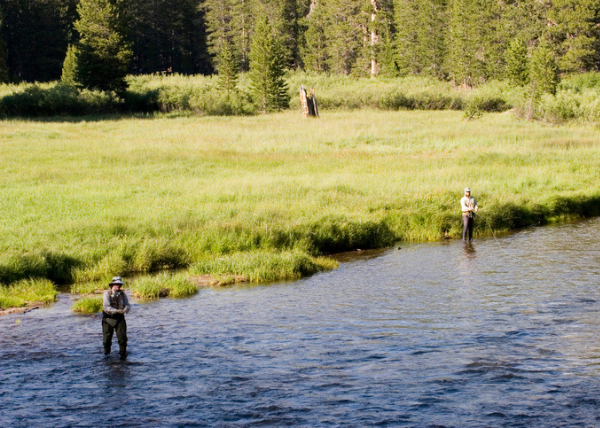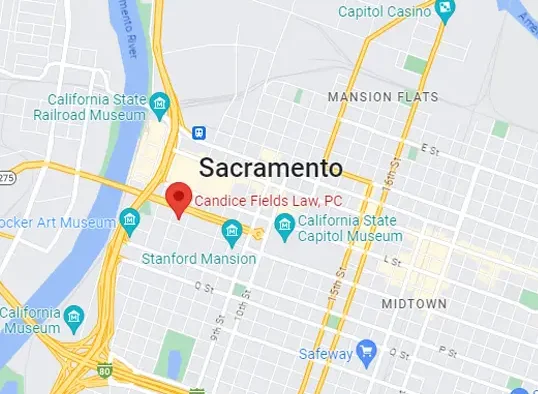Fish and Wildlife Lawyer
Navigating the complexities of fish and wildlife regulations requires an experienced fish and wildlife lawyer. Candice Fields Law, P.C. is equipped to provide the knowledgeable and strategic defense you need, whether you're facing charges at the state level in California or under federal law. Our firm is dedicated to representing individuals, businesses, and organizations charged with violations of fish and wildlife laws, ensuring your rights are protected throughout the legal process.
What Are Fish and Wildlife Regulation Violations?
Fish and wildlife regulation violations encompass many illegal activities that threaten wildlife conservation efforts, disrupt ecosystems, and undermine the sustainable use of natural resources. These violations can occur under California state and federal laws, each with regulations designed to protect fish, wildlife, and their habitats. Understanding the distinctions between state and federal violations is crucial for individuals engaging in hunting, fishing, or wildlife trade activities.
California Fish and Wildlife Regulation Violations
California's Department of Fish and Wildlife enforces regulations to preserve the state's diverse ecosystems. Violations of these regulations can include, but are not limited to:
- Illegal Hunting or Fishing: Hunting or fishing without a license, during closed seasons, or in restricted areas.
- Overlimit Violations: Taking or possessing more fish or game than the law allows.
- Illegal Trade of Wildlife: Unlawfully selling or purchasing wildlife or wildlife products.
- Habitat Destruction: Damaging protected habitats or engaging in activities that harm wildlife populations, such as illegal water dumping.
- Endangered Species Violations: Harming, harassing, or killing endangered or threatened species without a permit.
Violations can result in fines, criminal charges, and administrative penalties, including suspending or revoking hunting and fishing licenses.
What To Do If You Have Been Charged With a Fish or Wildlife Violation

Federal Fish and Wildlife Regulation Violations
Several federal agencies, including the U.S. Fish and Wildlife Service and the National Oceanic and Atmospheric Administration (NOAA), enforce laws protecting fish, wildlife, and their environments. Key federal laws include:
- The Lacey Act: Prohibits trade in wildlife, fish, and plants that have been illegally taken, possessed, transported, or sold.
- The Endangered Species Act (ESA): Provides for the conservation of endangered or threatened species throughout all or a significant portion of their range and the conservation of the ecosystems on which they depend.
- The Migratory Bird Treaty Act (MBTA): Protects migratory birds, their parts, eggs, and nests from unauthorized taking, selling, or transporting.
- The Marine Mammal Protection Act (MMPA): Protects all marine mammal species and their habitats.
Federal violations can lead to significant penalties, including fines, imprisonment, and forfeiture of equipment used in the commission of the crime (such as boats, vehicles, and gear).
Penalties for Fish and Wildlife Violations
Penalties for fish and wildlife violations vary significantly depending on the severity of the offense, whether the violation falls under state or federal jurisdiction and the specific laws that have been violated. Below, we outline the general penalties associated with these violations at the state and federal levels (using California as an example).
Penalties Under California State Law
In California, the Department of Fish and Wildlife (CDFW) enforces state laws pertaining to fish and wildlife. Violations can lead to a range of penalties, including:
- Fines: Monetary penalties for fish and wildlife violations in California can vary widely. Minor infractions might result in fines of a few hundred dollars, while more serious offenses, such as poaching or illegal trade of protected species, can result in fines of tens of thousands of dollars.
- License Suspension or Revocation: Individuals found violating hunting or fishing regulations may have their licenses suspended or permanently revoked, prohibiting them from legally hunting or fishing in the state.
- Criminal Charges: Serious violations, such as poaching endangered species or illegal wildlife trafficking, can lead to misdemeanor or felony charges, with penalties including imprisonment.
- Restitution: In addition to fines, violators may be required to pay restitution for the unlawful take of wildlife, which is intended to compensate for the loss of public resources.
Penalties Under Federal Law
Federal laws, enforced by agencies such as the U.S. Fish and Wildlife Service and NOAA, provide for the following penalties:
- Imprisonment: Serious federal offenses can lead to prison sentences. For instance, felony convictions under the Lacey Act can result in up to 5 years in prison.
- Fines: Federal violations can result in substantial fines, often much higher than state-level penalties. For example, violations of the Lacey Act, which prohibits illegal wildlife trafficking, can result in fines of up to $250,000 for individuals and $500,000 for organizations.
- Forfeiture of Property: Federal law enforcement can seize equipment used to commission wildlife crimes, such as vehicles, boats, and gear.
- License Suspension or Revocation: Similar to state laws, federal violations can lead to suspending or revoking hunting and fishing licenses and permits.
- Probation and Community Service: Violators may sometimes be sentenced to probation and required to perform community service, often in conservation or wildlife management programs.
What To Do If You Have Been Charged With a Fish or Wildlife Violation
If you've been charged with a fish or wildlife violation, the steps you take immediately following the charge can significantly impact the outcome of your case. Here's a concise guide on what to do:
1. Remain Calm and Cooperative
When facing charges, staying calm and avoiding any actions or statements that could worsen your situation is crucial. Be cooperative with law enforcement officials, but remember your right to remain silent about the details of the alleged violation until you have legal representation.
2. Document Everything
As soon as possible, document all details related to the charge, including the date, time, location, and nature of the alleged violation. If there were witnesses, note their names and contact information. Keep any physical evidence and documentation, such as licenses, permits, and photos that might be relevant to your case.
3. Do Not Discuss Your Case
Avoid discussing the details of your case with anyone other than your lawyer. This includes conversations in person, over the phone, or on social media. Comments made to friends, family, or on public platforms can be used against you in court.
4. Consult a Fish and Wildlife Lawyer
Contact a fish and wildlife lawyer as soon as possible. An experienced fish and wildlife attorney can provide legal advice tailored to your situation, help you understand the charges against you, and begin formulating a defense strategy.
5. Understand the Charges and Penalties
With the help of your lawyer, thoroughly review the charges against you and understand the potential penalties. Fish and wildlife violations can result in fines, license suspensions, and even criminal charges, depending on the severity of the offense.
6. Explore Your Legal Options
Your lawyer will explore all possible legal defenses and options available to you. This may include challenging the charges based on procedural errors, arguing for mitigating circumstances, or negotiating plea deals to reduce penalties.
7. Prepare Your Defense
Work closely with your lawyer to prepare your defense. This might involve gathering additional evidence, preparing for court appearances, and developing a clear and coherent narrative that supports your case.
8. Comply With All Legal Requirements
Follow your lawyer's advice and comply with all court requirements, including appearing at all scheduled court dates. Failure to comply can result in additional penalties or charges.
9. Consider Long-Term Compliance
Discuss future strategies for ensuring compliance with fish and wildlife regulations with your lawyer. This might include educational programs, practice changes, or other measures to prevent future violations.
Facing a fish or wildlife violation can be daunting, but taking these steps and working with a knowledgeable lawyer can help protect your rights and achieve the best possible outcome in your case. Candice Fields Law, P.C. is dedicated to providing legal representation for individuals facing fish and wildlife charges. Contact us to learn more about how we can assist you.
How a Fish and Wildlife Lawyer Can Help You
At Candice Fields Law, P.C., we understand the complexities and nuances of fish and wildlife law, both at the California state level and under federal jurisdiction. Our experience makes us uniquely qualified to assist individuals, businesses, and organizations facing charges or seeking to navigate the regulatory landscape of fish and wildlife management. Here’s how our fish and wildlife attorneys can help:
Experienced Legal Representation
If you’re facing charges for violations of fish and wildlife regulations, having an experienced lawyer is crucial. We provide vigorous legal representation, defending your rights in court and working to achieve the best possible outcome for your case. Our experience covers many violations, from minor infractions to serious federal offenses.
Navigating Regulations
Fish and wildlife laws are complex and vary significantly between jurisdictions. Our fish and wildlife lawyers can help you understand the specific regulations for your activities, whether hunting, fishing, engaging in wildlife trade, or managing land. We offer guidance to ensure your activities remain compliant, helping you avoid potential legal issues.
Mitigating Penalties
If you’re charged with a violation, the consequences can be severe, including fines, license suspensions, and even imprisonment. We work diligently to mitigate these penalties, whether through negotiation with prosecutors, challenging the evidence against you, or advocating for alternative penalties that minimize the impact on your life and livelihood.
License Restoration and Appeals
For individuals who have lost their hunting or fishing licenses due to violations, we can assist in appealing for license restoration. Our understanding of the regulatory framework allows us to present a compelling case for why your privileges should be reinstated.
Compliance and Prevention
Beyond addressing immediate legal challenges, our firm can help you establish practices and procedures ensuring compliance with ongoing fish and wildlife laws. This proactive approach is invaluable for businesses and organizations that regularly interact with natural resources, helping to prevent future violations and fostering sustainable practices.
Why Choose Candice Fields Law, P.C.?
- Experience: Our experience in fish and wildlife law means you receive knowledgeable and up-to-date legal advice.
- Personalized Service: We understand that every client’s situation is unique. Our approach is tailored to meet your specific needs and objectives.
- Proven Track Record: Our firm has a history of successfully defending clients against fish and wildlife charges and navigating complex regulatory issues.
- Commitment to Conservation: We share your passion for the outdoors and understand the importance of conserving our natural resources for future generations.
Facing fish and wildlife charges or looking to ensure your activities comply with the law? Candice Fields Law, P.C. is here to help. Contact us today to schedule a consultation and learn more about how our legal services can benefit you.





